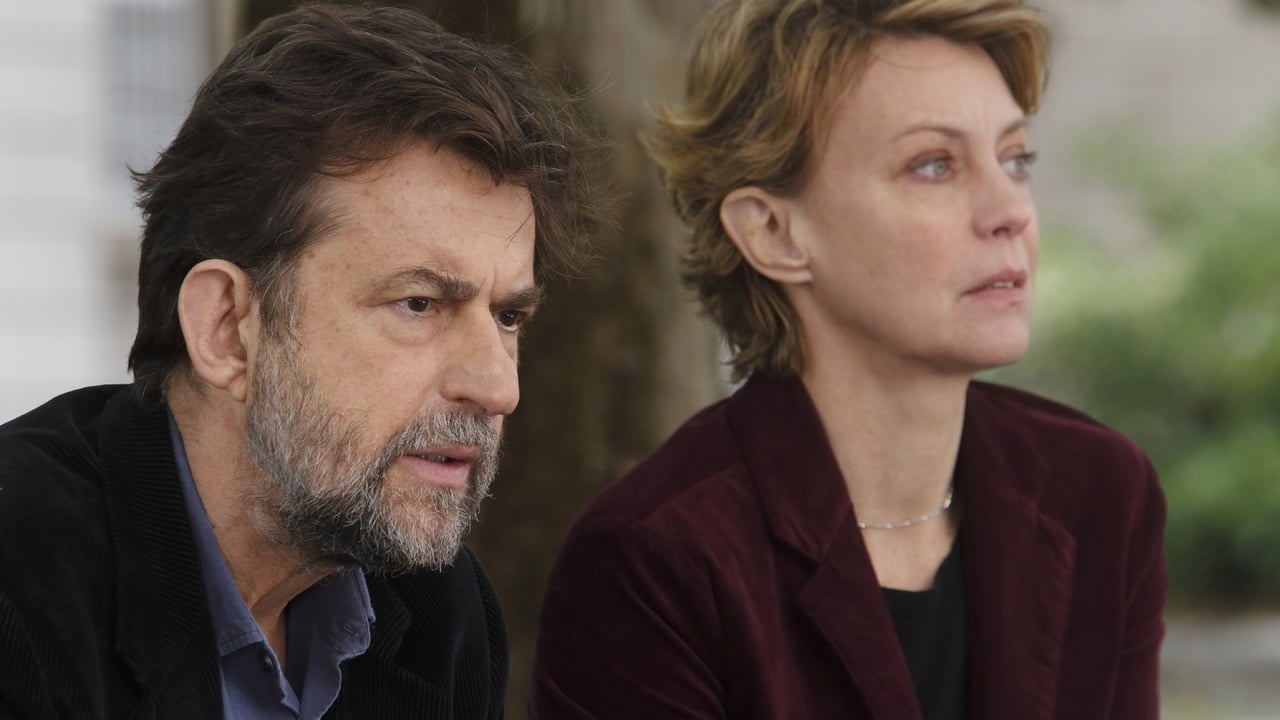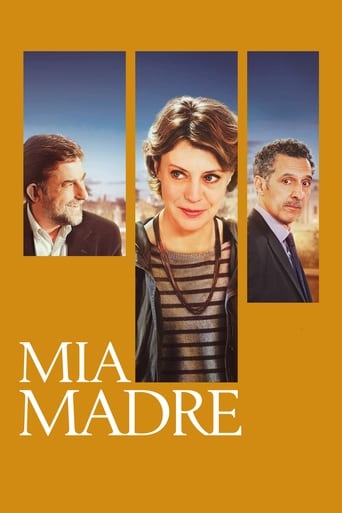SoftInloveRox
Horrible, fascist and poorly acted
Marva
It is an exhilarating, distressing, funny and profound film, with one of the more memorable film scores in years,
Wyatt
There's no way I can possibly love it entirely but I just think its ridiculously bad, but enjoyable at the same time.
Isbel
A terrific literary drama and character piece that shows how the process of creating art can be seen differently by those doing it and those looking at it from the outside.
aquauver
The lead character is a movie director and always in the position to dominate the team.Someone call her a little of arrogant lady.But once she turn the face to the hard condition to deal with,she is about to avoid it.She wants to erase this fact from her mind totally.She is weak as well as others but she isn't good at release it in public.
Paul Allaer
"Mia Madre" (2015 release from Italy; 107 min.; US title "My Mother") brings the story of Margherita (played by Margherita Buy). As the movie opens, we are in the mid of a film shoot, with Margherita as the movie's director. After the day's shoot, she visits her ailing mom (played by Giulia Lazzarini), who was recently hospitalized. Meanwhile Margherita also has to deal with her own issues, including the fact that she doesn't see any future in the relationship with her boyfriend Vittorio. Fortunately she get some help from her brother Giovanni (played by Nanni Moretti). But life becomes yet more complicated when Barry (played by John Turturro) arrives on the set of the film. To tell you more of the plot would spoil your viewing experience, you'll just have to see for yourself how it all plays out.Couple of comments: this movie is directed, co-written and co-produced by Nanni Moretti (who also plays one of the major roles). This is really two films within one: there is the family drama of how a brother and sister are coping with an ailing and hospitalized mother, and then there is the making of the 'social realist' film about a factory that may be cutting one-third of its labor force. It's not clear to me why Moretti choose to combine two two elements into one movie, as they are pretty much existing independently from each other, safe for one aspect: Margherita. That said, the acting performances are tops throughout the movie, perhaps none more so than Giulia Lazzarini as the ailing mother. Also note that John Torturro speaks mostly Italian in this role (I can only assume he already spoke Italian before this movie)."Mia Madre" premiered at the 2015 Cannes film festival, where it won one of the major prize. Out of the blue and without any fanfare or advertising, "Mia Madre" showed up at my local art-house theater here in Cincinnati this weekend. Why it's taken almost 18 months to get a release, I have no idea but better late than never I suppose. The Sunday matinée screening where I saw this at was attended poorly and I can't imagine this will play for more than a week. If you are in the mood for a quality foreign family drama with a lot of great acting performances, I'd readily suggest you check this out, be it in theaters, on VOD or eventually on DVD/Blu-ray.
Ruben Mooijman
Fifteen years after having made an acclaimed film about losing a child, Nanni Moretti now tackles the subject of losing a parent. 'Mia Madre' is a thinly veiled autobiographical film: Moretti's mother died while he was making his previous film, the comedy 'Habemus Papam'. To emphasize how strongly 'Mia Madre' is based on real events, the lead character in the film is a director, and the name of the mother (Ada) is very similar to Moretti's own mother's name (Agata).There are differences too. The director is a woman, not a man, and she is directing a serious social drama, not a comedy. While she has to give all her attention to the whimsical star of her drama, an American actor played by John Turturro, she has trouble accepting the truth of her mother's deteriorating health. Her mother simply cannot die now, she tells the doctor who breaks the sad news, because she still has so many things to do.Moretti has done a perfect job in showing how the death of a mother makes you go through an emotional roller-coaster. Margherita, the lead character, seems to be able to cope with a lot, including her lead actor making a mess of his role, but she breaks down when she wakes up at night to find her apartment flooded. It's only after such a calamity that Margherita is able to grieve. Actress Margherita Buy gives a very touching and subtle performance as the caring daughter on the one hand and determined director on the other hand.Turturro's role as the self-indulgent but incapable actor gives the film some comic relief, a welcome change from the emotional scenes dealing with the dying mother. Also, Moretti has inserted quite a few scenes which seem to divert from reality: sometimes you realize after a while that you're watching a dream-like scene that not really happened, but gives you some insight in what Margherita thinks or feels.'Mia Madre' is a film about strong emotions, but it never aims at cheap tear jerking effects. Moretti perfectly knows how to deal with death.
Helen Highly
When was the last time you heard a great last line in a movie? So great it made you burst into tears? The final line in "Mia Madre" is not a brilliant sentence in itself. (Then again, is "rosebud" profound in itself?) But in context – the way it references an earlier conversation in the film, as well as sums up the theme of the movie, and most importantly creates a definitive and meaningful end to the story (and endings are always difficult, even for the best filmmakers), in that way, this was an enormously powerful and stirring end – probably the best final line to a movie that anyone will hear in this 53rd New York Film Festival. And it literally made me cry out loud.Basically, this is a story about a woman whose mother is dying. But, don't imagine grim or depressing. Those Italians, they understand Sorrowful Life and Comical Death in ways that Americans just do not. It's like writer/director Nanni Moretti ("The Son's Room") is tapping into an ancient source of pure emotion. And he does it so gracefully. The film is gently, deeply astute. The lyricism in the language adds to the effect; Italian is such an elegant language. It's all part of this organic sensation that comes from the film – this gorgeous feeling that grows out of my stomach and blooms in my chest.In conversation after the screening, Moretti actually says that he wants the audience to feel that the movie is digging inside of them. That's exactly what I felt. Or, I felt the movie carving into me. As I watched, I felt like I was being sculpted. I felt as if a great master, Michelangelo, was carefully cutting, chiseling into me, and so he – the sculptor, the director, the writer – is making us – the audience – into his magnificent carved creation. And in that way, Moretti is elevating us with his talent, his vision. He is making us sublime.Except it really wasn't "us." It was just me alone and that movie. It was so intimate. I start off watching the movie from outside and thinking about it – thinking I will "review" it, and then I am in the movie. I am living it. It is living me. I am not audience observing a film; we are involved in each other in some palpable way. It's almost physical – like I can literally feel it touching me. It brings me to life in an odd way; I can feel my heart inside my body.Of course, the death of a parent is a universal experience, but this film manages to make it feel uniquely personal. I feel as if this director has been watching me in my life, with my family, and is now explaining myself to me. Although, I suspect it's an explanation that will feel relevant or resonant to nearly every adult. Perhaps the film score helps me to feel so fully enthralled – a variety of music from Leonard Cohen, Philip Glass, Nino Rota, and Arvo Part.Other critics may focus on the story that binds the film's emotions together. The lead character (played with glorious subtlety by Margherita Buy) is an Italian filmmaker who is shooting a movie while her mother is dying in a hospital. Actually, this is a semi- autobiographical film in that Mortetti had his mother die while he was shooting a previous film. However, I think that fact is more significant to the personal life of Moretti than to the body of this film; having an experience and elevating that experience to an art form are two very different things.In this movie, the story functions to bring in the outside world and its pressing realities and complexities. The specifics of what job the central character has are mostly inconsequential. Although, it is worth noting that the character's persistent and diligent return to the stress of her work environment, after each vigil beside her dying mother, shows that life goes on.But the story also functions by bringing smartly implemented humor. John Tuturro plays an American who is a hilariously bad actor in the film that our lead is trying to make. Tuturro's approach is broad and exuberant, which is startling in this otherwise quiet movie, and ultimately Tuturro's excited approach not only works but becomes essential to Moretti's message. I am laughing, I am crying, I am laughing, I am crying… I am exalted.Another running joke in the film is when our protagonist director repeatedly tells her actors to "be the character you are playing at the same time as you stand outside the character." No one understands this instruction, and finally the director herself admits that she doesn't know what she means. But I see this as appropriately consistent with my unusual experience of the film; I am both standing outside it, watching, and in it, experiencing.Fundamentally, this is a story about emotion. It's an exploration of humanity. It is life and death – beautiful and heartbreaking, devastating and inspiring. It was excruciating to watch a scene where our lead character is stripped naked and exposed (metaphorically); she's made vulnerable and cut to shreds – destroyed. Then, she goes and sits silently beside her dying mother, and that gives her new life. It revives her. It saves her. Death is breathing life while life is killing her.In the press conference, Moretti is talking, with his lovely Italian accent, and I hear… "love erupts in solitude." I don't even know what that means, but I totally feel it. I leave the theater feeling newly alive.

